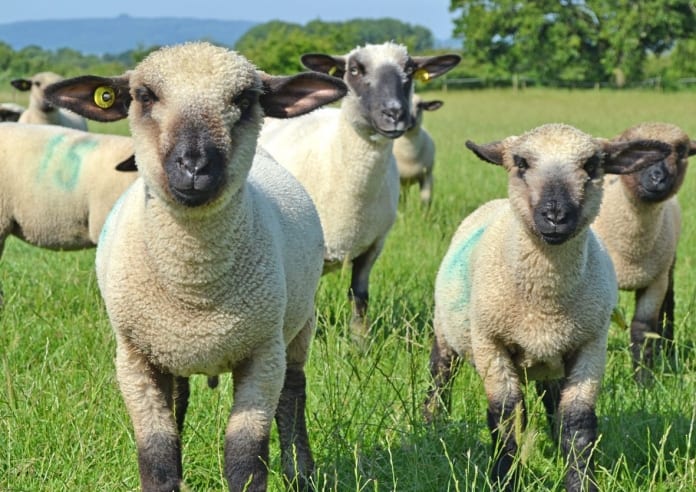Welsh sheep farms with good flock husbandry can prevent newborn lambs succumbing to diseases much more successfully than by routinely treating with antibiotics, especially when the focus is on colostrum and hygiene.
With good management, most lambs should be at low risk of watery mouth, joint ill and other diseases, sheep specialist Dr Fiona Lovatt, of Flock Health Ltd, assured farmers participating in a recent Farming Connect webinar.
The RUMA (Responsible Use of Medicines in Agriculture Alliance) targets state that it is not appropriate for all lambs to be treated routinely with antibiotics from the start of any new lambing season, yet it is very common for farmers to orally dose all lambs for watery mouth or inject every lamb to prevent joint ill.
Preventative treatment is only justified in individuals that have a significant risk of disease, such as triplets or very small lambs, Dr Lovatt insisted.
Whilst the practice of treating large numbers of healthy lambs is now less common, not a single flock should be using this approach, Dr Lovatt warned.
Apart from resistance issues, there is evidence to suggest that routine antibiotics could be detrimental to future performance because they upset the fragile gut microbiome of the newborn lamb.
“Your vet should not be prescribing antibiotics unless they are completely happy with how you are using them, it is a responsibility for all of us to not abuse the medicines available to us,” said Dr Lovatt.
Of the 129 farmers who participated in an anonymous poll run during the webinar, only 4% routinely gave all lambs injectable antibiotics in the last lambing season – the majority, 64%, gave none.
In that season, 46% didn’t administer any oral antibiotics, which is an improving picture since 38% of the participants said they fell into this category in previous years.
Joint ill is caused by Streptococcus dysgalactiae; there is evidence to suggest that ewes can be carriers, infecting lambs via the birth canal and milk.
“We used to think it was a disease of dirty lambing sheds but we see outbreaks on immaculate farms and that may be because they have a lot of carrier ewes,” said Dr Lovatt.
“In the short term it may be necessary to use injectable antibiotics for lambs born in that group but this does not mean that it is necessary to use antibiotics for every lamb born into the flock in future years.”
It is a disease that is exacerbated by a myriad of different issues including management factors such as the application of tags or rings for castration.
“Consider all practices and undertake a risk assessment with your vet that is specific to your flock,” said Dr Lovatt.
She advised dipping navels twice, at birth and six hours later, in a solution of 10% iodine and with a high alcohol content.
“This desiccates, dries and cleans,” she said. “I’m not in favour of using copper sulphate solution as I don’t think it dries the navel enough.”
Dipping is preferable to spraying. “You can’t get enough coverage with a spray,” said Dr Lovatt.
Ear tags and the applicators should be cleaned with surgical spirit before use on every lamb as they could introduce the bug into the lamb’s bloodstream.
A key to preventing all lamb diseases is to ensure the lamb gets plenty of good quality colostrum.
Ewe colostrum is 50g Immunoglobulin (IgG)/litre at lambing but the quality declines rapidly as does the lamb’s ability to benefit from it – by 24-36 hours old a lamb cannot absorb more IgG.
A 4kg lamb requires 20g IgG as quickly as possible for adequate passive transfer.
The energy in ewe colostrum is important too – it is 15% fat.
“At birth lambs have a store of energy in their brown fat but this diminishes after five hours so they require 200ml/kg colostrum in the first 24 hours simply to keep warm,” said Dr Lovatt.
Farming Connect, which is delivered by Menter a Busnes and Lantra, has received funding through the Welsh Government Rural Communities – Rural Development Programme 2014-2020, which is funded by the European Agricultural Fund for Rural Development and the Welsh Government.
Help keep news FREE for our readers
Supporting your local community newspaper/online news outlet is crucial now more than ever. If you believe in independent journalism, then consider making a valuable contribution by making a one-time or monthly donation. We operate in rural areas where providing unbiased news can be challenging. Read More About Supporting The West Wales Chronicle























